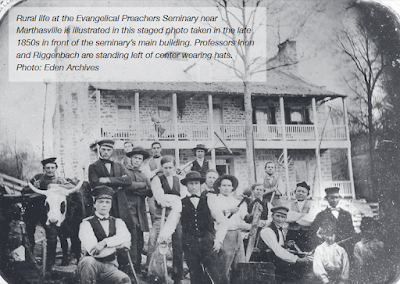The German Evangelicals who came to America found their roots in several European church traditions – Reformed, Lutheran, and Pietism. When William Biesemeier began his studies for the pastorate in 1858 he was associated with the Deutscher Evangelischer Kirchenverein des Westens (German Evangelical Church Society of the West). This congregation of believers has passed through a long series of name changes, unions and mergers, both in Prussia (Germany) and America. Today it is recognized as part of the United Church of Christ.
Pietism originated in Germany with the work of Philipp Spener (1635-1705), who emphasized “personal transformation through spiritual rebirth, individual devotion, and piety.” Several of his early proposals to reform the church have become the undergirding of modern Evangelicals:
Earnest and thorough study of the Bible in private meetings (little churches within the church)
Respectful evangelism that demonstrates kindness to the unbeliever
Theological training that encourages faith and devotional life
Smaller groups within the larger Pietistic movement included more rigorous practices:
Meeting together in conventicles (small groups) in order to mutually encourage piety
Identifying in their life an inner struggle with sin, a crisis, and a decision for a Christ-centered life
Shunning of worldly amusements such as dancing, theatre, and public games
Seeking union with God through spiritual exercises and the contemplative life
These Pietistic practices and beliefs, coupled with the traditions of the Reformed and Lutheran denominations, were significant pieces of the Evangelical movement in 18th and 19th century America.
William Biesemeier emigrated, along with two brothers, from his home in the Lippe Detmold area of Germany to Ogle county Illinois in the year 1854. After settling in his new American home, he set out for the Seminary of the German Evangelical Church in Marthasville Missouri, where he entered for the 1858-59 school year. This must have been a brave undertaking. It is unknown what educational opportunities William had participated in during his German childhood. But, he likely attended the Prussian Volksschule, which provided an eight year course of “. . basic reading, writing, singing and Christian religious education in close cooperation with the churches and tried to impose a strict ethos of duty, sobriety and discipline.”
The Seminary, informally known as the Preacher’s Seminary at Marthasville, had been conceived by a small group of German pastors and teachers in about 1850, and was incorporated in the year 1859. The original campus included, “. . a Farm House, Bake Oven, Friedensbote (Messenger of Peace) Publishing House, and the Dormitory.” The seminary existed at this site until 1883 and then moved to St Louis (Webster Grove) and eventually became Eden Theological Seminary.
A list of the students for the year 1858-59 includes William Biesemeier:
1. Kirschmann
2. Haas
3. Christoph F. Stark*
4. Andreas Muller*
5. Haberle
6. Buchmiiller
7. Ehlers
8. Kirchhoff
9. Gobel
10. Heinrich Siekmann*
11. Joachim Fr. Schulz*
12. Wilhelm Biesemeier*
13. Johannes A. Reidenbach*
14. J. Christoph Feil*
15. Karl F. Off*
*New Students; Of the nine new arrivals only three could write, and the remainder were not able to write correctly.
During the 1830s and 40s a large number of German families settled up and down the Missouri river, west of St Louis. The Preachers Seminary at Marthasville was “founded to prepare ministers to serve the growing number of German-immigrant congregations on what was then the western frontier.” The early German settlers believed that their leader’s Christian faith should be supported by critical scholarship. Today’s Eden Theological Seminary maintains an active and diverse archive. A series of brief articles at their website, under the heading This Week in Eden History, give insight into the life of the seminary and the larger church.
This delightful photo from the Eden archive, is dated late 1850’s, and could possibly include William Biesemeier. It adjoins the archive article titled Opening of Evangelical Preachers Seminary.
A biographical account of William Biesemeier informs us that he was ordained by the German Evangelical denomination in 1862 in Cincinnati Ohio and received a placement near Ackerville, Wisconsin in Washington County. An effort was underway to more firmly establish the German Evangelical church in Wisconsin, and over the next five years William Biesemeier served St John’s Church at Station and St Peter’s Church at Jackson. In 1867 he was called to Ogle County Illinois where he served the churches of North Grove and Adeline for thirty-five years.
For more details on William Biesemeier, visit his page at Family Stories, pamgarrett.com.
Further Reading:
The German Church on the American Frontier; Carl E Schneider, 1939.
Evangelical Minister Studied At Seminary in Marthasville; Sue Blesi, Franklin County Historian; 2016.
The Archives at Eden Theological Seminary; www.eden.edu/the-archives-at-eden-theological-seminary
About the photo:
Early building of the Seminary of the German Evangelical Church in Marthasville Missouri.
Moving back in time: Elba Josephine Hoffman 1898 > Josephine S Biesemeier 1866 > Rev William Biesemeier 1833.
Rev William Biesemeier is my husband’s great-great grandfather.


No comments:
Post a Comment